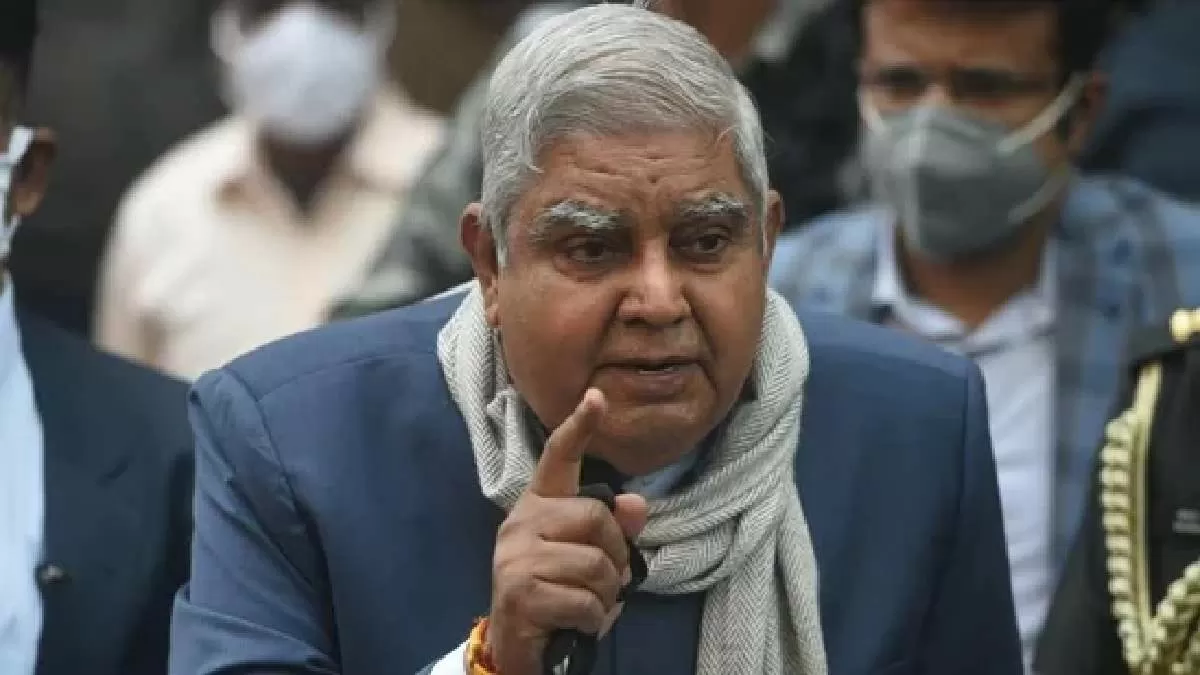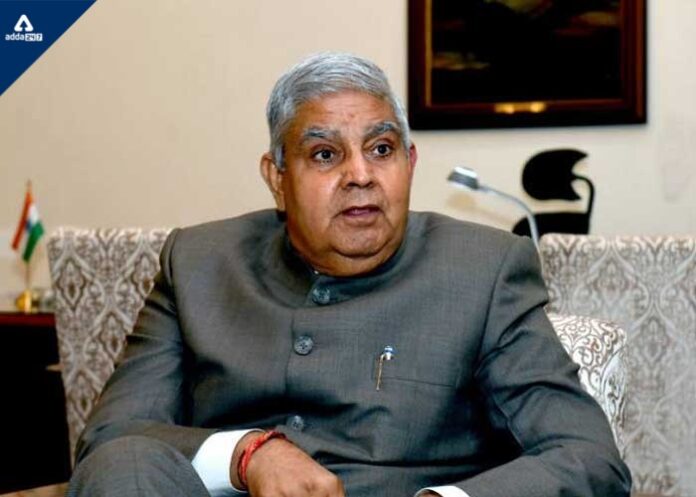In a sharp critique of the growing trend of Indian students heading abroad for higher education, Vice President Jagdeep Dhankhar recently dubbed this exodus as a “new disease” plaguing the country. Speaking at an event to celebrate the silver jubilee of the Sobhasaria Group of Institutions in Sikar, Rajasthan, Dhankhar expressed deep concern over the brain drain and the commercialization of education, both of which, he believes, are adversely affecting the quality of India’s academic institutions. He stressed the urgent need to reassess the motivations behind these trends and the toll they take on the nation’s economic and intellectual capital.

Brain Drain: A Symptom of India’s Educational Shortcomings?
In his address, Dhankhar did not mince words when describing the growing trend of Indian students opting to study abroad as a cause for concern. According to him, over 13 lakh Indian students chose foreign universities in 2024 alone, a staggering number that, in his view, reveals the lack of confidence in the domestic education system. He pointed out that students, lured by the dream of finding “heaven” abroad, are rushing into this decision without proper guidance or understanding of the long-term implications.
“There is a new disease of going abroad for studies,” he said. “Parents seldom get counseling before sending their kids abroad. The child is eager to go because they believe it’s a new dream.”
The Vice President underscored that the decision to study overseas is often made without assessing the quality or relevance of the foreign institutions or the country itself. Instead, it becomes a “blind race,” with students getting influenced by fancy advertisements and social trends. The perception of foreign education as a status symbol, combined with peer pressure and parental aspirations, plays a pivotal role in this exodus, said Dhankhar.
The Financial Educational Cost of Brain Drain
One of Dhankhar’s primary concerns is the financial burden this brain drain places on India. With over 13 lakh students studying abroad, the impact on India’s economy is immense. Dhankhar revealed that this phenomenon has drained over $6 billion from India’s foreign exchange reserves in 2024 alone.
“If those $6 billion were used to improve the infrastructure of our own educational institutions, their condition would have been much better,” Dhankhar remarked.
The Vice President urged both students and parents to reconsider the narrative that higher education abroad is automatically superior to what Indian institutions can offer. He suggested that investing this substantial amount within India’s own academic infrastructure could dramatically raise the quality and global competitiveness of local universities.
Moreover, this financial strain affects not only the students who often take on heavy loans but also the nation, which loses young talent to other countries that benefit from these individuals’ contributions.
Commercialization of Education: A Growing Concern
In addition to the brain drain, Dhankhar voiced his concerns over the rampant commercialization of education, which he said has significantly degraded its quality. The Vice President lamented how institutions that once operated as charitable organizations, dedicated to knowledge and societal progress, have now become profit-driven enterprises.
“Education becoming a business is not good for the future of the nation,” he warned.
Dhankhar stressed that education should never be treated as a commodity. Instead, it should remain a medium of sacrifice and charity aimed at building a healthy, well-educated society. By commercializing education, the nation is losing sight of its original purpose, and this shift towards profit-making is compromising the quality of learning, which in turn pushes students to seek better opportunities abroad.
“While institutions should be financially sustainable, it is essential for industries to nurture them. Corporate houses should use their CSR funds to build institutions and fund new courses,” he added, calling for more involvement from the private sector in uplifting the quality of domestic education.

Peer Pressure and Social Trends Fueling the “Abroad Education Dream”
Another driving factor behind the decision to study abroad is societal pressure. For many students, studying overseas is not just an academic decision but a social one. The notion that foreign universities are inherently superior to Indian ones has become ingrained in the minds of many students and parents. As Dhankhar pointed out, students between the ages of 18 to 25 are heavily influenced by advertising and social media, which portray studying abroad as a glamorous, life-changing experience.
“There is little assessment of where they are going. You will be surprised by how much boys and girls get influenced by fancy advertisements,” Dhankhar said.
This pressure often begins in peer circles, where students feel the need to match the decisions of their friends. Parental aspirations further compound this issue, as many parents see their children’s foreign education as a status symbol. Unfortunately, this rush to follow the latest trends can lead to hasty, uninformed decisions, resulting in high costs and uncertain futures for many students.
Reassessing the Value of Indian Education
Vice President Dhankhar’s remarks highlight a critical issue: the growing dissatisfaction with India’s educational system is leading to a significant brain drain, both in terms of talent and financial resources. While the lure of studying abroad is undeniable, the societal pressure and commercialization of education are pushing students to seek alternatives that may not always be in their best interest or that of the country.
Dhankhar’s message is clear: India must invest in its own educational infrastructure and create institutions that can rival global standards. At the same time, students and parents must take a more thoughtful approach to higher education, evaluating both foreign and domestic options on their true merits, not just the allure of studying abroad. Only then can India retain its brightest minds and ensure a sustainable future for its education system.


